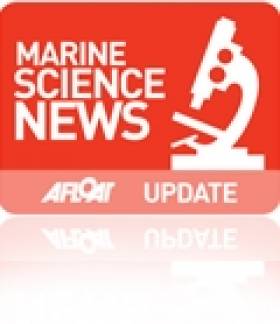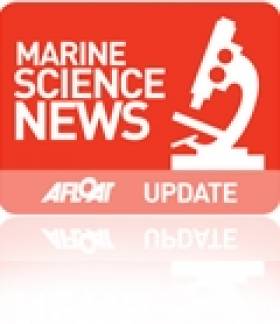Displaying items by tag: ROV Holland I
Research Vessel on Hydrographic Survey Calls to Dun Laoghaire
RV Celtic Voyager is an inshore RV and she can accommodate 6 - 8 scientists with a maximum endurance of 14 days. According to her intensive survey schedule she is currently conducting hydography work for this month entirely. To read her complete survey programme click HERE.
In 2002 she was joined by a second though considerably larger vessel the 65m RV Celtic Explorer, which is six times larger than her fleetmate in terms of tonnage, which is 2,425grt. Apart from all the scientific and deck machinery she can also handle seven 20-foot containerised laboratories.She has accommodates for 35 personnel, including 19-21 scientists and has an endurance window of 30 days.
The vessel was also built by the same Dutch shipyard and both are owned by the Marine Institute. Ship management of the Galway based pair is provided by P&O Maritime Services (Ireland) Ltd.
In addition the ROV Holland I a deepwater Remotely Operated Vehicle is operated on board the RV Celtic Explorer. The ROV is named after John Phillip Holland from Liscannor, Co. Clare who was an early inventor and builder of submarines. For more information about the ROV which forms as part of tonight's 'Sea2Sky' event in Salthill, Galway, as previously reported on Afloat.ie click HERE.
Today is European Researchers Night, where the ROV will be on display in Galway
- Marine Institute
- Dublin Bay News
- Ports and Shipping
- Ports and Shipping News
- ROV Holland I
- Dun Laoghaire News
- Marine Science News
- Dun Laoghaire Harbour News
- Marine Instistute Research vessels
- Damen B.V. Shipyard
- P&O Maritime Services Ltd
- Submarine inventor John Philip Holland
- John Holland
- Irish research vessels
Irish to Lead Europe in Research Vessel Productivity
These figures compare favourably with our European counterparts, reflecting a high level of activity on national and international research and monitoring programmes.
Work duties in 2011 for the Galway based vessels will range from fisheries surveys to underwater mapping and from climate studies to deepwater surveys with the remotely operated submersible ROV Holland 1. The work schedule will facilitate training missions and to carry out essential maintenance work on Ireland's network of data buoys that, in parallel to their research function, supply the vital information on which weather and shipping forecasts are based.
The increased activity of the research vessels reflects the growing imperative to understand and sustainably manage the economic potential of our offshore marine territories, an area over ten times that of Ireland itself.
A major role of the ships' workload will be commercial fish stock assessments. Together they are to devote 141 days on stock surveys in support of the sustainable management of Ireland's fisheries.
The RV Celtic Voyager will conduct underwater television surveys of valuable prawn stocks off the Aran Islands, the Irish and Celtic Seas, working on blue whiting, a survey of herring stocks in the north-west. In addition a comprehensive 54-day annual Irish Groundfish Survey which will take place in stages all around the Irish coast from September to December.
The survey will be the largest undertaken by an Irish research vessel and is essential to providing the scientific data used to inform the annual quota negotiations required in Brussels each year.
For the 2011 schedule for both vessels is available to view by clicking HERE and the Maritime Institute website click this link.
At 65.5m RV Celtic Explorer (2,425grt) accommodates 35 personnel and up to 21 scientists and 31.4m RV Celtic Voyager (340grt) with up to 8 scientists and a maximum endurance of 14-day days. For detailed technical specifications of the Dutch built vessels, RV Celtic Explorer, click here to download a PDF file and for the RV Celtic Voyager click here
For further information contact: Dr John Joyce, Communications Manager of Marine Institute on 087 2250871

























































